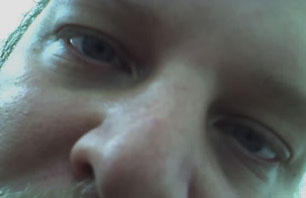Daily Verb"To have"มี mee
mee
Daily Noun"Woman, ladies"ผู้หญิง phuù-yíng
phuù-yíng
"Man, men"ผู้ชาย phuù-chaay
phuù-chaay
Daily Adjective"One"หนึ่ง neŭng
neŭng
"Two"สอง saáwng
saáwng
Daily "?" Word"General ?"ไหม maí
maí
Daily Other Word"No, not"ไม่ maì
maì
 mee
meeDaily Noun"Woman, ladies"ผู้หญิง
 phuù-yíng
phuù-yíng"Man, men"ผู้ชาย
 phuù-chaay
phuù-chaayDaily Adjective"One"หนึ่ง
 neŭng
neŭng"Two"สอง
 saáwng
saáwngDaily "?" Word"General ?"ไหม
 maí
maíDaily Other Word"No, not"ไม่
 maì
maìDaily Qualifier"Person"คน
 kohn
kohnThe letters for today are the letter M (ม), the letter H (ห), and the vowel EE ( -ี which looks like a fish with a tail... as opposed to without a tail). In the verb "mee" above, the consonant ม comes first, and then the vowel ( -ี ) above it. Vowels in Thai can come before or after, above or below the consonant they follow.
The letter ห is a bit special. This can be a "silent H" that effects the consonant it precedes. When you see this H sound followed immediately by a consonant, such as in our daily question word, "maí" above, it basically (for lesson #1 at least) is telling you to hold that consonant a little bit longer. So therefore, instead of "maí", it should be prounced "mmmaí".
Notice the differences betweeen the question word, "maí" and the negative "maì". The question word has a slightly longer, "M" to it, and a brighter, rising "AI" to it... sort of like a question actually. The negative "maì" has a regular length "M" to it, and if you see that little apostrophe above the "M" (ม่), that is the sign of a falling tone. Therefore the negative word is a short "M" with a failing, almost "sighing" "AI".
There is very little grammar in Thai: The only thing that is important to note is that every noun has an accompanying "qualifier". The best example I have for this in English is the fact that nobody asks for "Two pants." People always ask for "Two pairs of pants." All nouns in Thai follow this rule (as opposed to just pants)... however, in today's world, Thai people aren't using qualifiers as much. However, it should be included, and the order is "noun | adjective | qualifier".
Therefore, you can say "มี ผู้ชาย สอง คน" (mee phuù-chaay saáwng kohn... "There are men 2 people.") or you can say "มี สอง ผู้ชาย" (mee saáwng phuù-chaay... "There are 2 men.") which is essentially using the noun as its own qualifier. (Try to use the qualifier though... it really impresses the Thai people.)
Nouns and verbs are not conjugated or pleuralized. Oftentimes subjects are discarded. Therefore, "หนึ่ง ผู้หญิง" (mee neŭng phuù-yíng... "There is 1 girl") and "มี สอง ผู้หญิง" (mee saáwng phuù-yíng... "There are 2 girls"): No verb conjugation (is/are), no subject (There), and no pleuralization of nouns (girl/girls).
In order to ask a question, in its simplest form, you simply put "ไหม" (maí) at the end of the sentence: "มี สอง ผู้หญิง ไหม" (mee saáwng phuù-yíng maí... "Are there 2 girls?") The simplest (and most common) affirmative response to this would be to simply repeat the verb: มี (Mee.)
The negative response to this question would be to put the negative "no/not" word, ไม่ (maì) in front of the verb it is negating. ไม่ มี (maì mee... "No, there are not.")
Just as a final word for this lesson, pronunciation is really important. Thai people have much less ability to understand their language spoken with a foreign accent than other people. The difference between maí and maì, both the rising and falling sounds, and the length of the "M" are vitally important to being understood. Just to give you an idea, the two "MAI" words we learned today are only 2 of 8 "MAI" words out there that you have to differentiate between. (And if you think that is bad, wait until we get to the 14 "KAO/KHAO" words.)




2 comments:
I like your first Thai lesson and I hope you continue. I'm trying to learn Thai as well using the Pimsleur recordings. In lesson 18 they claim that wife is "pahn-ya" but my dictionary says "pahn-ra-ya" (among other choices).
What does "pahn-ya" actually mean?
Sorry... no idea. Both my memory and Thai-language.com have no listing of "Pahn-ya" in their lexicon... only "pahn-ra-ya."
Thanks for your comment. I'm moving the Thai lessonss to every Tuesday because they take about an hour to put together, and I can't afford to do one every day.
Post a Comment